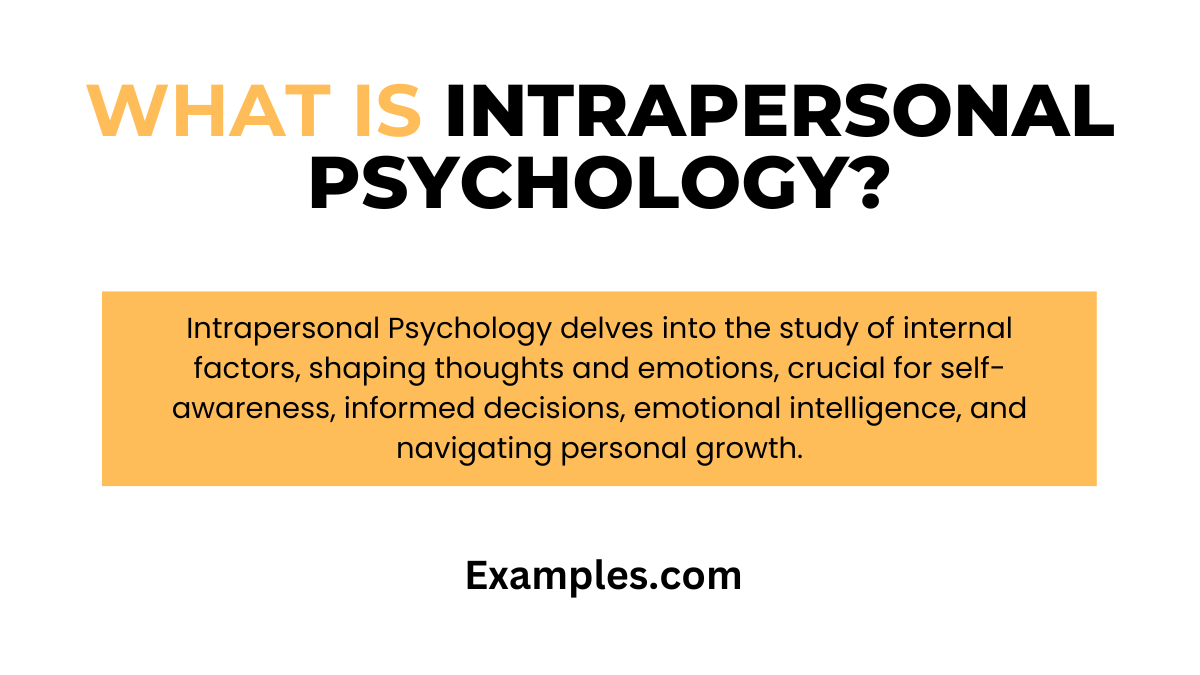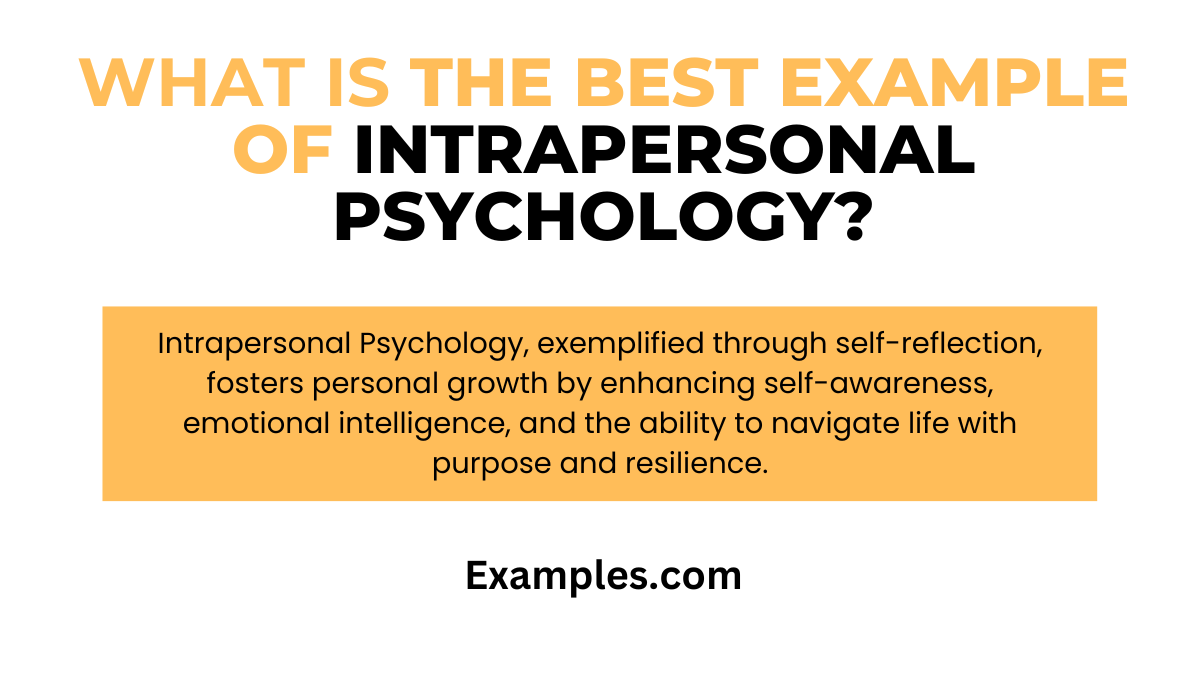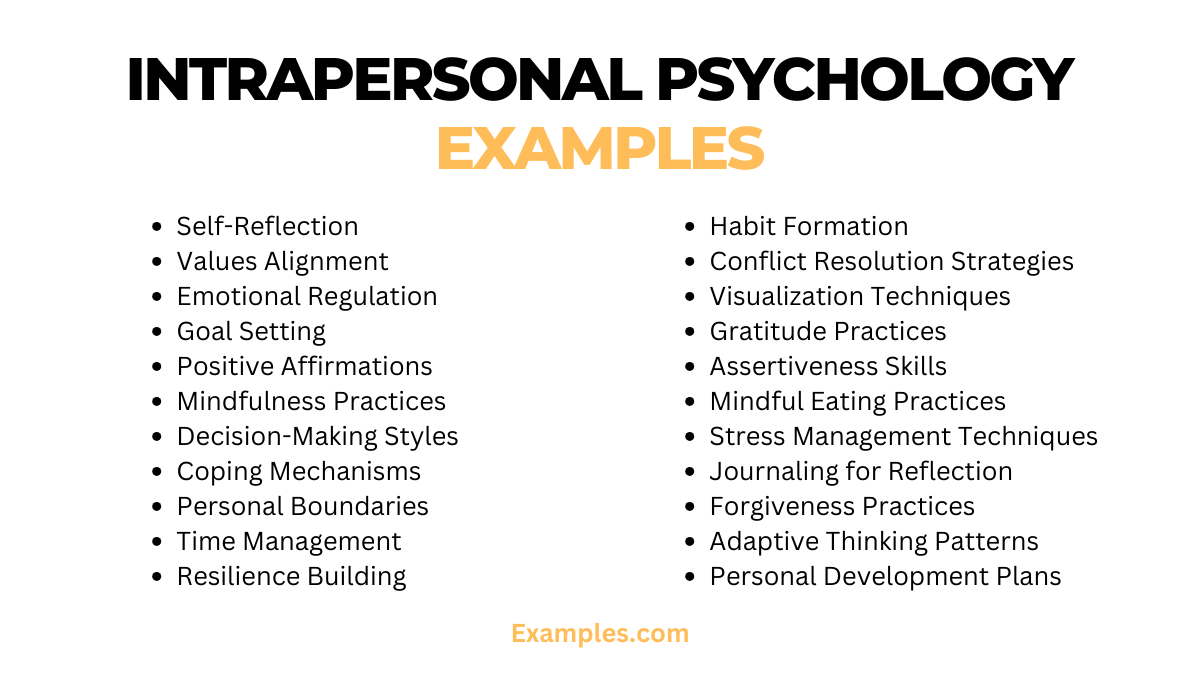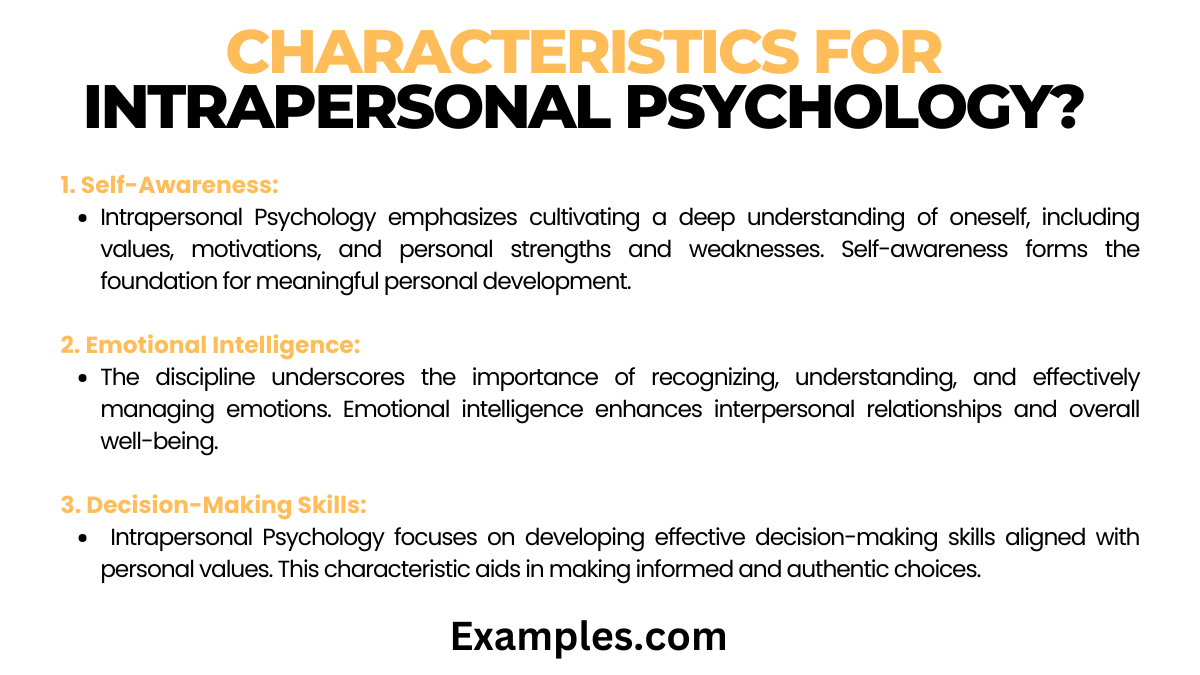24+ Intrapersonal Psychology Examples
Embark on a comprehensive journey through Intrapersonal Psychology—a guide delving into the intricacies of personal insight, emotions, and behaviors. Uncover the power of self-awareness, motivations, and cognitive processes. This extensive guide not only provides theoretical foundations but also integrates real-life Communication Examples, offering practical insights to enhance your intrapersonal skills and foster meaningful connections with yourself and others. Elevate your understanding and navigate the complexities of your inner world with actionable tips and valuable examples.
What is Intrapersonal Psychology?

Intrapersonal Psychology refers to the study of internal elements that shape an individual’s thoughts, emotions, and behaviors. This field explores aspects such as self-awareness, personal values, motivations, and cognitive processes. Understanding Intrapersonal Psychology is essential for gaining insights into one’s inner world, making informed decisions, fostering emotional intelligence, and navigating the complexities of personal growth and well-being.
What is the Best Example of Intrapersonal Psychology?

An exemplary illustration of Intrapersonal Psychology involves the process of self-reflection leading to personal growth. Through introspection, an individual assesses their thoughts, emotions, and behaviors, gaining self-awareness. This example showcases how understanding and managing internal elements, such as motivations and cognitive processes, contributes to enhanced emotional intelligence and the ability to navigate life with purpose and resilience. Intrapersonal Psychology empowers individuals to shape their inner world positively for a more fulfilling life journey.
25 Intrapersonal Psychology Examples

Explore a diverse array of Intrapersonal Psychology examples, each shedding light on the complexities of internal elements. These real-life scenarios showcase the application of self-awareness, personal values, and cognitive processes, providing valuable insights for personal development and emotional intelligence.
- Self-Reflection: Engaging in regular introspection enhances self-awareness, aiding personal growth.
- Values Alignment: Making decisions aligned with personal values fosters authenticity and fulfillment.
- Emotional Regulation: Managing emotions effectively contributes to enhanced well-being and resilience.
- Goal Setting: Setting and achieving meaningful goals fuels a sense of purpose and accomplishment.
- Positive Affirmations: Using affirmations promotes positive self-talk and boosts self-esteem.
- Mindfulness Practices: Incorporating mindfulness enhances present-moment awareness and emotional balance.
- Decision-Making Styles: Understanding personal decision-making styles shapes effective choices in various situations.
- Coping Mechanisms: Developing healthy coping mechanisms aids in managing stress and challenges.
- Personal Boundaries: Setting and communicating boundaries fosters healthy relationships and self-respect.
- Time Management: Efficient time management reflects an awareness of priorities and enhances productivity.
- Resilience Building: Navigating setbacks with resilience promotes adaptability and emotional strength.
- Habit Formation: Establishing positive habits contributes to long-term personal and professional success.
- Conflict Resolution Strategies: Utilizing effective conflict resolution skills maintains harmonious relationships.
- Visualization Techniques: Incorporating visualization enhances focus and goal attainment through mental rehearsal.
- Gratitude Practices: Cultivating gratitude positively impacts mental well-being and overall life satisfaction.
- Assertiveness Skills: Assertive communication fosters healthy relationships and self-advocacy.
- Effective Communication with Oneself: Enhancing self-dialogue promotes a positive inner narrative and self-understanding.
- Stress Management Techniques: Implementing stress management techniques mitigates the impact of daily stressors.
- Journaling for Reflection: Keeping a journal facilitates self-reflection and the tracking of personal insights.
- Forgiveness Practices: Practicing forgiveness contributes to emotional healing and interpersonal harmony.
- Adaptive Thinking Patterns: Shifting to adaptive thinking patterns promotes a positive outlook on life.
- Personal Development Plans: Creating and following a personal development plan supports continuous self-improvement.
- Mindful Eating Practices: Mindful eating cultivates a healthier relationship with food and body awareness.
- Grit and Perseverance: Developing grit and perseverance fuels long-term goal achievement.
- Effective Sleep Hygiene: Prioritizing good sleep habits positively impacts overall well-being and cognitive function.
Intrapersonal Psychology for Students Examples
Discover how Intrapersonal Psychology benefits students by fostering self-awareness, emotional intelligence, and effective decision-making. These examples provide practical insights into developing valuable life skills for academic and personal success.
- Self-Reflection Journals: Encourage students to maintain self-reflection journals, fostering awareness and growth.
- Goal-Setting Workshops: Conduct workshops to teach students the power of setting and achieving meaningful goals.
- Emotional Regulation Exercises: Introduce exercises promoting emotional regulation for a positive learning environment.
- Decision-Making Simulations: Engage students in decision-making simulations to enhance critical thinking and choices.
- Peer Conflict Resolution Seminars: Conduct seminars on effective conflict resolution to build healthy relationships.
Intrapersonal Psychology for Adults Examples
Explore how Intrapersonal Psychology empowers adults to navigate complexities, make informed choices, and achieve personal fulfilment. These examples highlight practical applications for enhancing well-being in various aspects of adult life.
- Work-Life Balance Strategies: Implement strategies for balancing work and personal life to reduce stress and enhance fulfilment.
- Values-Based Decision-Making Workshops: Conduct workshops on aligning decisions with personal values for authenticity.
- Mindful Leadership Training: Provide training on mindful leadership to enhance emotional intelligence in the workplace.
- Resilience Building Seminars: Offer seminars on building resilience to cope with challenges and setbacks effectively.
- Effective Communication Skills Coaching: Coach on assertive communication for healthier relationships and self-advocacy.
Intrapersonal Psychology for Kids Examples
Explore how Intrapersonal Psychology for kids establishes foundational skills for emotional intelligence, resilience, and positive social interactions. These examples focus on nurturing crucial intrapersonal skills during the formative years.
- Emotion Recognition Games: Engage kids in fun games to recognize and express their emotions effectively.
- Values Storytelling Sessions: Conduct storytelling sessions emphasizing positive values and character development.
- Mindful Breathing Exercises: Introduce simple mindful breathing exercises to help kids manage stress and anxiety.
- Friendship Skills Workshops: Teach essential friendship skills, including effective communication and conflict resolution.
- Positive Self-Talk Activities: Implement activities promoting positive self-talk and building self-esteem.
These examples illustrate the diverse applications of Intrapersonal Psychology tailored for students, adults, and kids, fostering personal growth and well-being.
How can you use psychology to improve your intrapersonal development?
Intrapersonal development is a journey of self-discovery and growth, and incorporating psychology into this process can be transformative. Here’s a comprehensive guide on leveraging psychological principles to enhance your Intrapersonal Psychology:
- Self-Awareness and Reflection:
- Utilize introspective techniques to understand your thoughts, emotions, and motivations.
- Engage in regular self-reflection to identify patterns and areas for improvement.
- Emotional Intelligence Enhancement:
- Learn to recognize and regulate your emotions effectively.
- Practice empathy to understand others’ perspectives and enhance interpersonal relationships.
- Cognitive Restructuring:
- Identify and challenge negative thought patterns.
- Foster adaptive thinking to cultivate a positive mindset and resilience.
- Goal Setting and Motivation:
- Set clear, achievable goals aligned with your values.
- Understand intrinsic and extrinsic motivators to drive sustained personal development.
- Effective Decision-Making:
- Incorporate decision-making frameworks to make informed and confident choices.
- Consider long-term consequences and align decisions with your values.
- Mindfulness Practices:
- Integrate mindfulness techniques to stay present and reduce stress.
- Cultivate mindfulness in daily activities to enhance focus and awareness.
- Values Alignment:
- Identify and prioritize your core values.
- Ensure your decisions and actions align with these values for authenticity.
- Building Resilience:
- Embrace challenges as opportunities for growth.
- Develop coping mechanisms to bounce back from setbacks stronger.
What are the characteristics for Intrapersonal Psychology?

Intrapersonal Psychology explores the intricacies of an individual’s inner world, encompassing thoughts, emotions, and self-perception. Understanding its key characteristics is fundamental for personal growth, emotional intelligence, and effective self-management.
1. Self-Awareness: Intrapersonal Psychology emphasizes cultivating a deep understanding of oneself, including values, motivations, and personal strengths and weaknesses. Self-awareness forms the foundation for meaningful personal development.
2. Emotional Intelligence: The discipline underscores the importance of recognizing, understanding, and effectively managing emotions. Emotional intelligence enhances interpersonal relationships and overall well-being.
3. Decision-Making Skills: Intrapersonal Psychology focuses on developing effective decision-making skills aligned with personal values. This characteristic aids in making informed and authentic choices.
4. Reflection and Mindfulness: Encouraging regular self-reflection and mindfulness practices is a hallmark of Intrapersonal Psychology. These techniques enhance present-moment awareness and foster a deeper connection with oneself.
5. Goal Setting and Achievement: Intrapersonal Psychology emphasizes the process of setting meaningful goals and working towards their achievement. Goal-oriented behavior contributes to a sense of purpose and accomplishment.
6. Resilience and Coping Strategies: Understanding and building resilience are integral components. Intrapersonal Psychology equips individuals with coping strategies to navigate challenges, setbacks, and stressful situations effectively.
7. Positive Self-Talk: Promoting positive self-talk is a characteristic that enhances self-esteem and contributes to a positive inner narrative. Intrapersonal Psychology encourages individuals to cultivate a supportive and affirming dialogue with themselves.
8. Values Alignment: Aligning decisions and actions with personal values is a key characteristic. Intrapersonal Psychology recognizes the importance of authenticity and living in harmony with one’s deeply held principles.
Tips for Effective Intrapersonal Psychology?
Intrapersonal Psychology serves as a powerful tool for self-discovery and personal development. To optimize its effectiveness, consider the following tips:
- Cultivate Self-Awareness: Develop a habit of introspection to understand your thoughts, emotions, and motivations. Regularly reflect on experiences to enhance self-awareness.
- Set Meaningful Goals: Align your goals with your values. Establish clear and achievable objectives to provide direction and purpose in your personal and professional life.
- Practice Mindfulness: Incorporate mindfulness techniques, such as meditation and deep breathing, to stay present and focused. Mindfulness enhances emotional regulation and reduces stress.
- Embrace Positive Affirmations: Integrate positive affirmations into your daily routine. Use uplifting statements to foster a positive self-image and cultivate a resilient mindset.
- Values Alignment in Decision-Making: Prioritize decision-making aligned with your core values. This ensures authenticity and a sense of fulfillment in your choices.
- Develop Emotional Intelligence: Enhance your ability to recognize and manage emotions, both yours and others’. Emotional intelligence contributes to effective communication and relationship-building.
- Set Boundaries: Establish healthy boundaries to protect your well-being. Clearly communicate your limits in personal and professional interactions, promoting self-respect.
- Regular Reflection Journals: Maintain a reflection journal to record insights, experiences, and personal growth. Reviewing entries provides a valuable record of your intrapersonal journey.
In conclusion, Intrapersonal Psychology serves as a transformative guide, unlocking the door to self-discovery, emotional intelligence, and personal growth. Through diverse examples tailored for students, adults, and kids, this comprehensive guide illuminates the path to enhanced well-being and a more purposeful life journey. Embrace the power of understanding oneself for a fulfilling and resilient existence.



